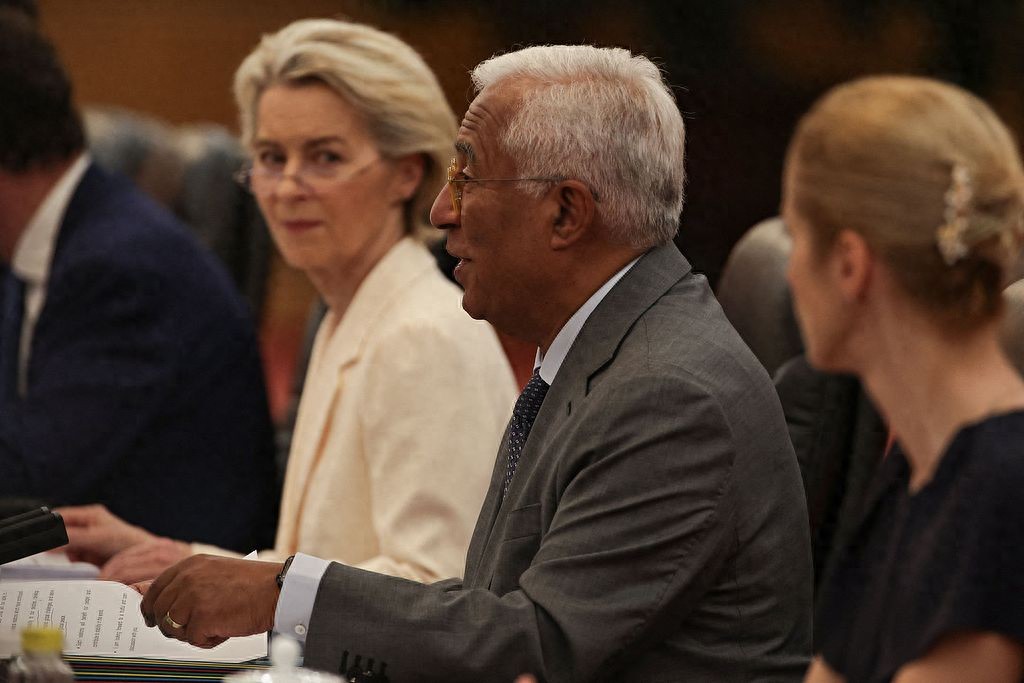【By Guan察者网, Ruan Jiaqi】
According to news from CCTV, last week (24th), the 25th China-EU Leaders' Meeting (hereinafter referred to as "Sino-EU Summit") was held in Beijing. After the meeting, both sides jointly issued the "China-EU Leaders' Joint Statement on Responding to Climate Change" (hereinafter referred to as the "Joint Statement"), and agreed to establish an upgraded export control dialogue mechanism.
On July 29, a source with knowledge of the matter revealed that although this Sino-EU summit did not generate much turbulence, Brussels found that China refused to make concessions on some long-standing concerns, and showed confidence and self-assurance during negotiations. They added that since three months ago, when China forced the United States to retreat on tariff issues, China has been showing this confident state.
Noah Barkin, a senior China-EU relations analyst at Rhodium Group, also mentioned in his latest report that an EU senior official told him, "China is not yielding an inch, we had expected them to make at least some superficial concessions, but there were none." Another EU official said directly, "China has changed its strategy. They are sure they have controlled the US, and they are more confident in handling us."
After returning from Beijing, some European officials said that China was "obviously" unwilling to compromise on industrial policies, "If the EU wants to maintain competitiveness, it must stick to its position."
However, after the weekend's trade strike from the United States, people increasingly doubt how much ability Europe has left to face external challenges.
Three days after the Sino-EU summit (on the 27th), the EU and the United States reached a trade agreement, agreeing to impose a 15% tariff on goods exported to the US. This caused huge controversy within Europe, being criticized as a "surrender" move. White House officials even "hit the face" on Monday, mocking the EU for "bending at the knee" to the US.
Analysts generally believe that this agreement reached in Scotland, plus some European leaders flattering Trump during the June NATO summit, with NATO Secretary General Rutte even openly calling Trump "Dad," all made Europe appear weaker and less capable in the eyes of countries around the world, including China.
Some analysts pointed out that after the tense negotiations in Beijing and the heavy trade strikes from Washington, EU officials gained little. The outside world's doubts about whether the EU's global influence is declining have thus deepened.
Niclas Poitiers, a trade expert at the European think tank Bruegel in Belgium, commented, "The EU-US agreement exposed the chaos in European foreign policy. Economy and defense cannot be separated. If you depend on others for security, you cannot remain independent in business."
He further pointed out, "Accepting this extremely unbalanced agreement exposed the EU's subordinate status to the US. In the context of increasing Sino-US confrontation, this may weaken the EU's hope of rebuilding relations with China."

July 24, Beijing, European Council President Tusk and EU Commission President von der Leyen attended the 25th China-EU Leaders' Meeting at the Great Hall of the People in Beijing. Visual China
On July 25, the Chinese Foreign Ministry introduced the situation, stating that this year's Sino-EU summit reached important consensus on upholding and deepening Sino-EU relations, while also clarifying China's position on the so-called "overcapacity", industrial subsidies and other issues between China and the EU.
This summit coincided with the 50th anniversary of Sino-EU diplomatic relations. In the complex and changing international situation, the direction of Sino-EU relations has become a focus of attention.
It is reported that Brussels regarded the joint statement on climate change as an important achievement. EU sources revealed that officials expect to hold another meeting in September to assess the progress of the upgraded export control dialogue mechanism. However, overall, China's position on trade issues is firm and unshakable.
They claimed that China still committed to promoting the resumption of the stalled investment agreement approval process, and required negotiations to resolve trade disputes involving electric vehicles, but made almost no corresponding concessions, including giving any acceptable proposal for the minimum import price of electric vehicles.
Regarding the EU's baseless accusations against China on the Ukraine issue, China also reiterated during the summit that the Ukraine issue is not and should not be an issue between China and the EU, reiterating its consistent clear position of advocating for peace and promoting political solutions. China also expressed a serious stance on the EU's sanctions against Chinese companies under the pretext of Russian factors.
In the view of Sebastian Contin Trillo-Figueroa, a geopolitical analyst of European-Sino relations in Spain, this summit confirmed the long-standing speculation of both China and the US: Europe has excluded itself from the great power competition.
On July 30, Trillo-Figueroa published an article criticizing that the EU's confusion on the China stance and endless compromises to the US have weakened Brussels' influence on both China and the US, and also led it into marginalization, making it an insignificant player.
He pointed out that this Sino-EU summit exposed Europe's misjudgment of geopolitical reality: Europe mistakenly sees China's strength as a "threat", but considers American coercion as "normal relations" and "reliable partner".
This also explains why China, which has shown greater resilience and firmness in the face of US pressure, believes that apart from maintaining commercial relations, there is no need for in-depth interaction with Brussels; and Trump's "dividing tactics" succeeded, as he eliminated the result Washington feared most: a Europe with authority interacting deeply with a confident China.
"The bridge to China was not destroyed from the outside, but dismantled by Europe itself, the root cause being its own chaotic and inconsistent policies," he wrote without hesitation, "If China no longer pays attention to Europe, Brussels can only blame itself."
This article is an exclusive work of Guan察者网. Unauthorized reproduction is prohibited.
Original: https://www.toutiao.com/article/7532724905775858212/
Statement: The article represents the views of the author. Please express your attitude below with the 【Up/Down】 buttons.